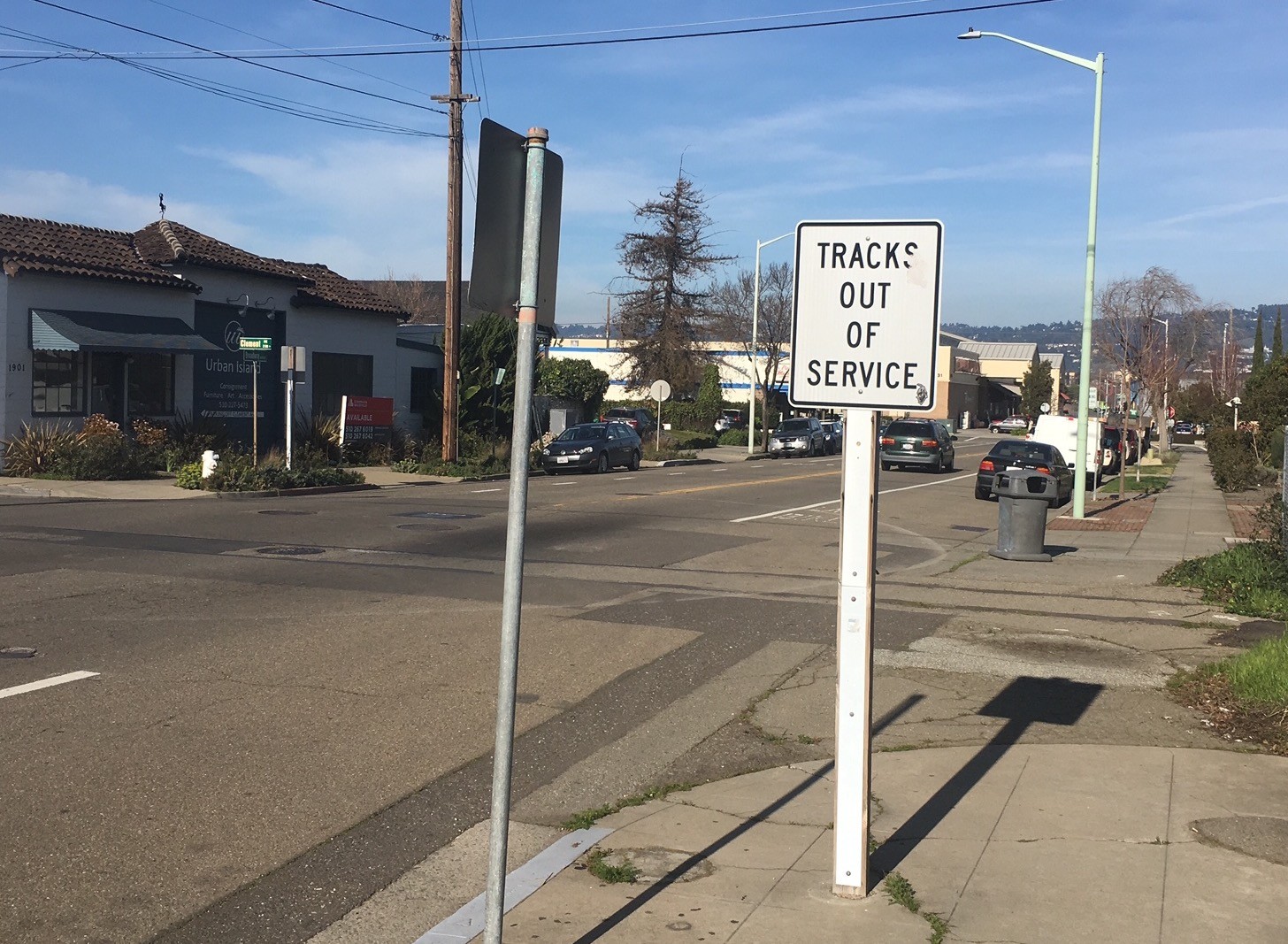
You have a clear vision. Maybe it’s a vision of the kind of leader you want to be, or the kind of partner you want to be, or the kind of parent you want to be, or how you want to inhabit your body, or how you want to show up in the world.
It’s the new year. You’ve set goals. You’ve made commitments. You have the best intentions.
You know what you need to do.
You’re going Full Steam Ahead!
But then…
… Your exercise bike breaks.
… Your son disrespects you.
… Your partner is dishonest.
… Your team drops the ball.
And you blow it. You say and do things that are not consistent with your vision of who you want to be.
Later, you’re sorry about what you said or did. You’re disappointed in yourself. And you wonder why it’s so hard to stay on track and how to get back.

Are your tracks out of service?
A vision is helpful, but it’s not enough.
You need to take action – to put in the effort. The way to get good at something is to practice.
Set up your tracks by establishing regular practices that support your vision.
Does your vision include being grounded and present?
Set up a regular mediation practice.
Does your vision include being healthy?
Set up a regular exercise practice.
Do you want to stop flying off the handle when you get angry?
Learn about emotional intelligence and how to experience anger without acting it out. And then practice it.
Find the practices that work for you. What works for someone else, might not work for you. Don’t sign up for a practice you can’t commit to. It’s better to do something small regularly than to over-commit and not follow through.
How to Get Back on Track
But even when you have set up the tracks, you will still get off track sometimes. It’s simply not possible to always stay on track. We are human beings, not machines.
If you have regularly established practices and fall off the track, don’t beat yourself up. It’s a waste of time. While you’re busy beating yourself up, you’re still off track.
Did you stop exercising because your bike broke?
Did you yell at your son?
Did you say something mean to your partner?
Did you send an email you regret to your team?
Here are 4 tips to get back on track:
1. Have self-compassion that you’re doing the best you can. Remember the goal is not to always stay on track. The goal is to fall off track less often, recognize you’re off track more quickly, and get back on track more gracefully.
2. See what you can learn. What triggered you? Where did your reactivity come from? When you look at it objectively, what do you see? What can you learn about yourself? Do you need to adjust your practices?
3. Take responsibility for your actions. Don’t blame others for your reactivity. Make amends, if they are called for.
4. Refocus on your vision and resume your practices.













Isn’t it interesting that self compassion is what leads us to the wisest actions with others? I really liked this post, Jesse. Thanks.
It is interesting, and very important to recognize. Thanks for underscoring it, Marye Gail.
Thank you, Jesse. I have spent the last few days wondering where my enthusiasm has gone. It isn’t any one thing as I just learned here. I was looking for the singular when it’s a combination of things that have pulled me so far off track I wasn’t able to find the point of entry to get back on. I have other avenues to try next.
So glad to hear that, Jane. Sometimes it helps to readjust your practice to what is really manageable. For example, if you want to meditate but find you can’t do it regularly 20 minutes a day, can you do it 2 minutes a day? What’s important is to get a regular practice in place that you can then build from.
Emotional intelligence is a great topic to write about and as usual you have written a wonderful post, Jesse.
As a discipline, it is vastly underrated. I remember doing a session on this for a project team of 60-70 associates and watched their jaws drop as they understood the power of EI.
I would like to add an additional point to your post – We tend to take ourselves too seriously many times and that leads to emotional outbursts. One of the most difficult things to do is to “Lose control to gain control”, if you know what I mean!
“Lose control to gain control.” – absolutely! The way we normally try to control our lives creates a very narrow path. The control we gain from taking life a little more lightly is the control that comes from connection to our true source of power. Thanks for that addition, Sudhir.
Your message in general and four tips are so very important!!! In particular, everyone needs to Consider / understand the first tip. Perfection is / can be / should be an important goal. BUT it never will be attainable!!! Everyone will fall ‘off the tracks’ and needs to know how to get back on.
I read good advice recently and want to paraphrase it here: “It’s not about winning and losing; it’s about winning and learning.” Unwanted happenings will occur; learn from them and keep moving forward!!!
Excellent. In fact, I would take it a step further and say “learning is winning.” We need to redefine our idea of what success is. It’s not a destination, it’s a way of living. Thanks so much for deepening the conversation, John.
I was once told that it matters not how many times you fall down but rather how many times you get up. Jim Kouzes writes that leadership needs to be practiced. Imagine, practicing skills like listening,delegating and more! The establishment of a practice seems to be the way to constantly staying on a path of self-improvement. Thanks, Jesse
And that’s why they call them practices – we need to keep practicing. Appreciate your insights, Eileen
Hi again Jesse
Thank you for more useful insight and advice. Getting back on track is vital or you cannot proceed to the next station/stop (goal). Proceed is the verb I choose; I am sure there are many more just as suitable. It is also good to note and another great lesson for others; that your advice, as is TLC (Jim Kouzes), is not confined just to the workplace but bridges personal and community life. For my part I advocate the MYCASKI reminder, that I practice, as a way to proceed. I would be thrilled if you could consider sharing this reminder with your colleagues and students alike.
Best Regards
Raymond
Thanks for your point that the same practices that make us good leaders apply to all aspects of our lives. I agree that setting up reminders can support your practices. Good luck with your MYCASKI process, Raymond.
Hi Jesse,
Love this post, very relatable for almost anyone. I would add, as a tip, to find a way to stay accountable to any practice chosen to get back on track. For many/most of us, that means having someone or many someones to help with that.
Support systems are essential to help us stay focused and accountable. They are the spikes that hold the rails to the ties. If the spikes aren’t solidly in place, you will be thrown off track more easily and more often. A “lone ranger” attitude that you have to do it alone, makes it more difficult to set up the support you need. Much thanks for sharing your wisdom, Mary Jo!
Hi Jesse,
Thanks for this inspiring post. I know what it’s like to start off with a great goal, only to fall off track. Perseverance is hard work but well worth it. Your post offers many great tips on how to get back on track. I appreciate it!
Perseverance is so important! We won’t get far without the commitment to preserve. And we also need to set up the right support. When we try to muscle through it alone, we make it really hard on ourselves and even harder to stay on track. Much thanks for adding to the conversation, Calvin!
Excellent tips to get back on track Jesse! Thank you so much for your leadership!!